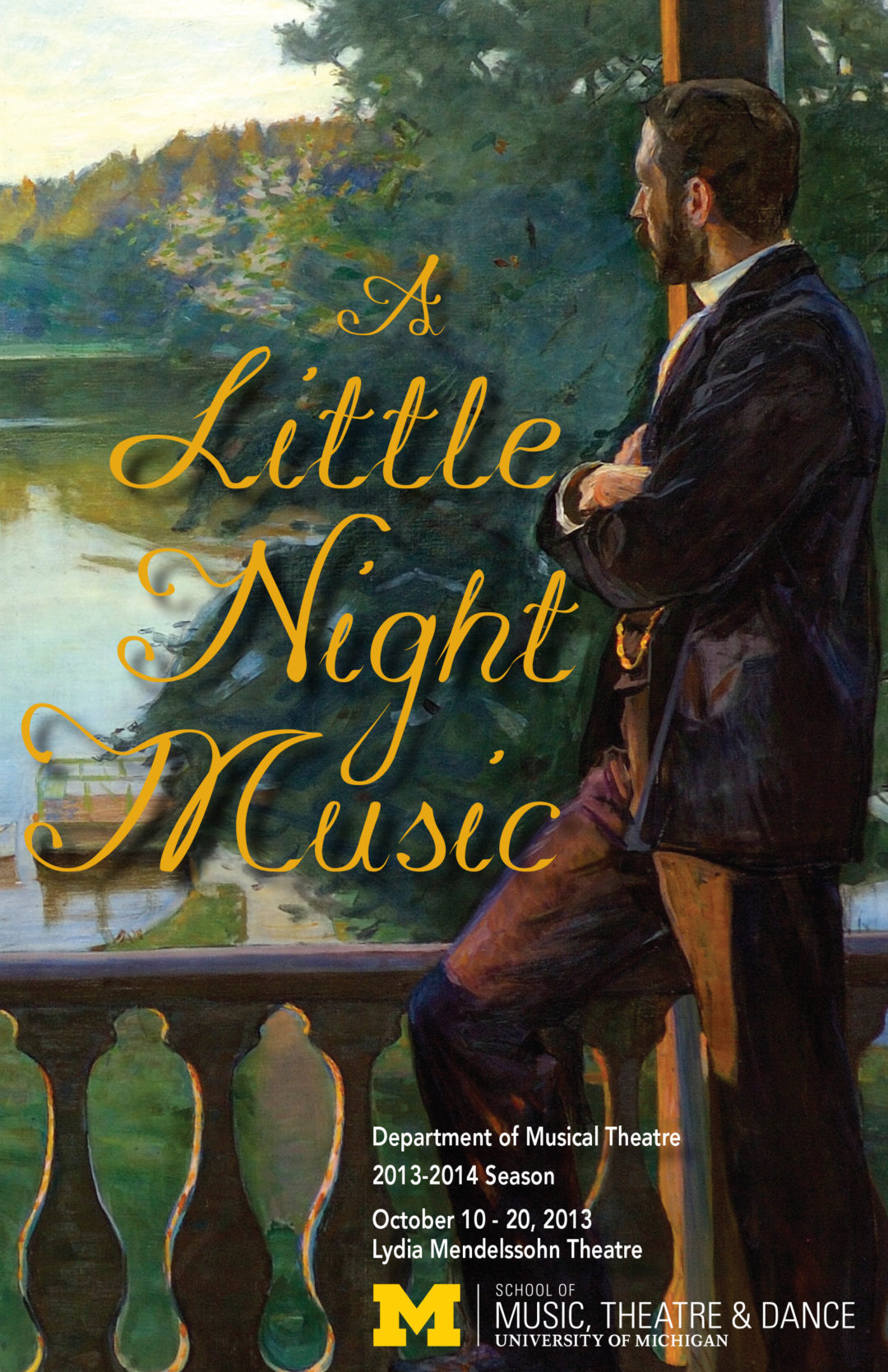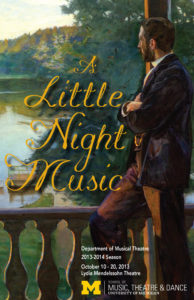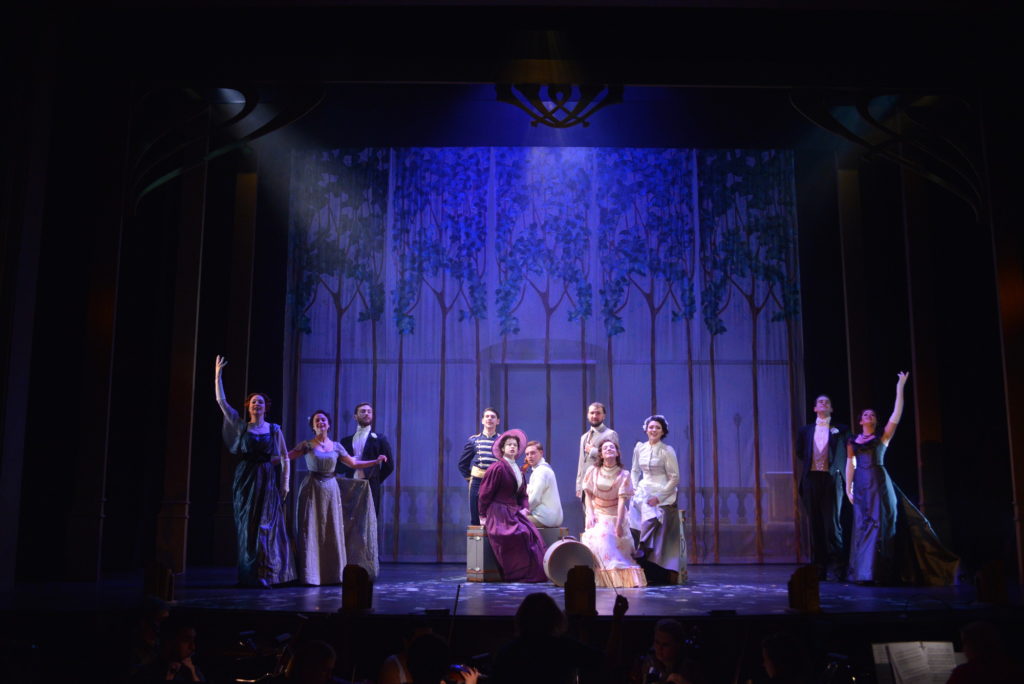A Little Night Music
Music & lyrics by Stephen Sondheim
Book by Hugh Wheeler
Department of Musical Theatre
October 10-20, 2013 • Lydia Mendelssohn Theatre
The Story: Set in the enchanted birch groves of Sweden in 1900, A Little Night Music sings and waltzes its way through the lives of mismatched couples who are about to make some very surprising discoveries about their true desires. In an ever-thickening plot, the couples come together on a midsummer’s night when the sun never sets for “A Weekend in the Country.” Anything can happen on a warm summer night – to the very young, to the very foolish, and to the very old.
Background: Based on Ingmar Bergman’s film Smiles of a Summer Night, Stephen Sondheim and Hugh Wheeler’s A Little Night Music has garnered numerous awards since its debut in 1973. Clive Barnes of the New York Times declared it “Heady, civilized, sophisticated and enchanting. The book is uncommonly urbane and witty … [while] the music is a celebration of three-quarter time, an orgy of plaintively memorable waltzes, all talking of past loves and lost worlds.” Featuring Sondheim’s touching “Send in the Clowns,” A Little Night Music speaks to adoration, regret, and second chances for lost love.
Artistic Staff
Director: Mark Madama
Music Director: Ben Whiteley
Conductor: Catherine Walker Adams
Scenic Designer: Arthur Ridley
Costume Designer: Christianne Myers
Lighting Designer: Aaron Tacy
Sound Designer: Jim Lillie
Wig & Makeup Designer: Erin Kennedy Lundsford
Choreographer: Whitney Brandt
Stage Manager: Laura Beth Cohen
Cast
Madame Armfeldt: Kaity Paschetto
Desirée Armfeldt, her daughter an actress: Eleanor Todd
Fredrika Armfeldt, Desirée’s daughter: Kelsey Moore
Fredrik Egerman, a lawyer: Conor McGiffin
Anne Egerman, his second wife: Darcy Link
Henrik Egerman, his son: Alex Prakken
Count Carl-Magnus Malcolm, a dragoon: Elias Wygodny
Countess Charlotte Malcolm, his wife: Jordana Grolnick
Petra, the Egerman maid: Keaton Micucci
Frid, Madame Armfeldt’s butler: C.J. Eldred
Bertrand, Madame Armfeldt’s page: Sam Yabrow
Malla, Desirée’s maid: Kalia Medeiros
Osa, Madame Armfeldt’s maid: Brittany Browning
A page: Alexander Miller
The Liebeslieder Singers
Mrs. Anderson: Ellie Fishman
Mr. Erlanson: Ross Yoder
Mr. Lindquist: Zachary Thompson
Mrs. Nordstrom: Chelsea Groen
Mrs. Segstrom: Reilly Richardson
Resources
[accordion title=”About the Play”]
Shortly after West Side Story had opened in 1957, Harold Prince and Stephen Sondheim first came up with the notion of collaborating on a musical with a score made up entirely of waltzes. But unable to find a suitable property, they put the notion aside to work on other projects. After their prizewinning Follies had opened in 1971, they resumed their search for a basis for their “waltz” musical. They asked Hugh Wheeler to aid them in their search, but it was Sondheim who recalled Ingmar Berman’s 1956 film, Smiles of a Summer Night, one of the film maker’s few comedies. The three men screened the film and immediately knew they had found the right property. Mr. Bergman was approached and sold them the rights when he was assured that the producer did not intend “a rigid adaptation” of his film, but rather a musical freely suggested by it. Thus, A Little Night Music was born, “a stylist celebration of romantic love, set in the enchanted birch groves of Sweden at the turn of the century.”
Sondheim composed all the songs for Night Music in three-quarter time or multiples of that meter; this served as the play’s concept and tied it together. Subtexts were injected into almost every song – most notably in “Every Day a Little Death,” which allows a countess to express her feelings of loneliness as a philanderer’s wife. In addition, Sondheim devoted himself to the “inner monologue song,” which is a song, a Time critic explained, “in which characters sing of their deepest thoughts, but almost never to each other.” Though Night Music addresses the standard musical-comedy subject, love – it “is a masquelike affair, tailor-made to fit Sondheim’s flair for depicting confused people experiencing ambivalent thoughts and feelings,” the Time reviewer assessed.
A Little Night Music burst upon the Broadway scene with a magic that was enthusiastically acclaimed by audiences and critics. Clive Barnes of the New York Times rapturously exclaimed: “Good God! – an adult musical! Heady, civilized, sophisticated and enchanting…Hugh Wheeler’s book is uncommonly urbane and witty… The jokes are funny, and the very real sophistication has considerable surface depth… Then, of course, there are Stephen Sondheim’s breathtaking lyrics” and his “music is a celebration of three-quarter time, an orgy of plaintively memorable waltzes, all talking of past loves and lost worlds.” Opening of February 25, 1973, the show ran for 601 performances and won a parcel of awards, notably, the New York Drama Critics’ Circle Award for best musical, six Tony Awards (including one for best musical), and three Drama Desk Awards.
—from Great Musicals of the American Theatre
[/accordion]
Media
Program
Photos
[cycloneslider id=”13-14-a-little-night-music”]



